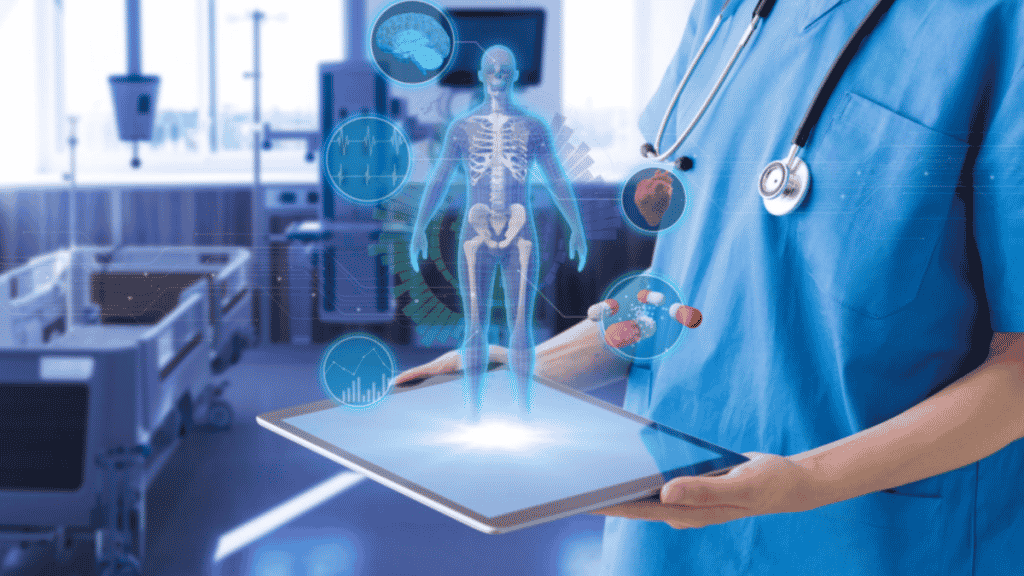The global Covid-19 pandemic has catalyzed change in the healthcare industry. A growing aging population, coupled with increased life expectancy and a shortage of nurses has shone the spotlight on advances in medical technology, heralding a new approach to nursing. Nurses are the missing link between medical technology and the growing demand for improved healthcare.
Medical technology and automated processes hold the key to augmenting efficiency and productivity, as well as to address systemic disparities. Smart gadgets and mobile apps optimize labor-intensive processes in real-time, reducing the margin for human error and freeing valuable nursing resources to undertake the responsibilities that require human eyes and hands.
Nurses play an increasingly integral role in the evolution of care delivery strategies through the collection, storage and use of data that smart tech enables. Furthermore, a UChicago Harris / AP-NORC poll revealed that nearly 80% of Americans trust nurses, whose primary output is patient-centric care.
How Telehealth is Paving the Way for Change
The rise of telehealth in response to the pandemic has assisted healthcare providers in making quicker diagnoses, which translates into time and revenue savings for patients and healthcare providers.
Telehealth consultations assist patients:
- By helping them to understand when they need further testing, medication, or medical advice
- By limiting the number of patients physically visiting healthcare facilities, thus reducing exposure from patients who have contagious disease
- By assisting patients to understand when they can be treated with over-the-counter medication and when they need to consult a healthcare professional.
Smart Pumps; Smarter Medication
Smart IV pumps expedite the automation of medication dosages and drips. Self-pumps enable patients to administer their own pain medication, as and when required.
Portable Monitoring Devices
Portable monitoring devices are ideal for nurses who are moving around helping other patients. Nurses can oversee patients’ vital signs and have peace of mind that the data is transmitted to a central monitor that will alert them to emergencies. These levels have historically been measured by humans, on the hour.
Hospital Beds
Not only do smart hospital beds provide safety and comfort for patients during long hospital stays by reducing in-hospital patient injuries, but they also provide monitoring functions such as tracking movement, weight, and vitals. By having an in-room patient monitor, nursing staff receive real-time updates, providing opportunities for different diagnoses and understandings of patient pathology.
Digital Tools and Smart Gadgets that Boost Productivity
An array of smart gadgets have the power to transform nursing and prioritization of care. Wearable notepads, portable voice recorders and smart clipboards now ensure that nurses can multi-task efficiently.
What are the Barriers to Digital Nursing?
534 000 healthcare workers in the United States voluntarily quit their jobs in August 2021 citing stress, burn out and general lack of resources. Through the development of leadership channels, by embracing the need for continuing education, and replacing antiquated systems and software with medical technology, the nursing industry is in a powerful position to reduce the barriers to care.
A New Way of Leading
A change in leadership is necessary for nursing: from managing nurses to leading the systems that enable them to gather and apply data in clinical workflows. By developing nurses as leaders, the industry stands poised to make a significant impact on technology research and science. Two newly defined roles have received a great deal of interest: that of Chief Nursing Officer (CNO) and Chief Nursing Informatics Officer, and the reason for that is that these roles encompass the clinical and technological aspects of nursing.
Changes in Nursing Education
Nurses need to skill up to keep pace with digital advances. By completing a Doctor of Nursing Practice online program, nurses have the capacity to work full-time and the flexibility for self-investment and continuing professional development. An Accredited Doctor of Nursing Practice online program enables nurses to achieve clinical excellence and the highest level of training available.
Furthermore, the American Association of Colleges of Nursing (AACN) has advocated that the Doctor of Nursing Practice Degree be the requisite qualification for those who want to pursue their careers in advanced practice nursing. Attaining a DNP empowers today’s nurses to become tomorrow’s nurse leaders and maximize their impact on the healthcare industry.
It’s Time for a System Update
By moving forward into the digital future, the healthcare industry has the resources required to provide relief to overworked, stressed nurses, helping them to connect patients with their preferred level of care.
In Conclusion
The future of healthcare is dependent on the development of nurses and their ability to harness big data to optimize delivery models of care, to meet the demands of the population. Considerable investments have been made into smart tech to relieve over-burdened, burnt-out healthcare providers and the prognosis indicates that AI will fill an increasingly prominent role in the future. Continuing professional development will be essential for nurses to keep pace with the changing landscape.
